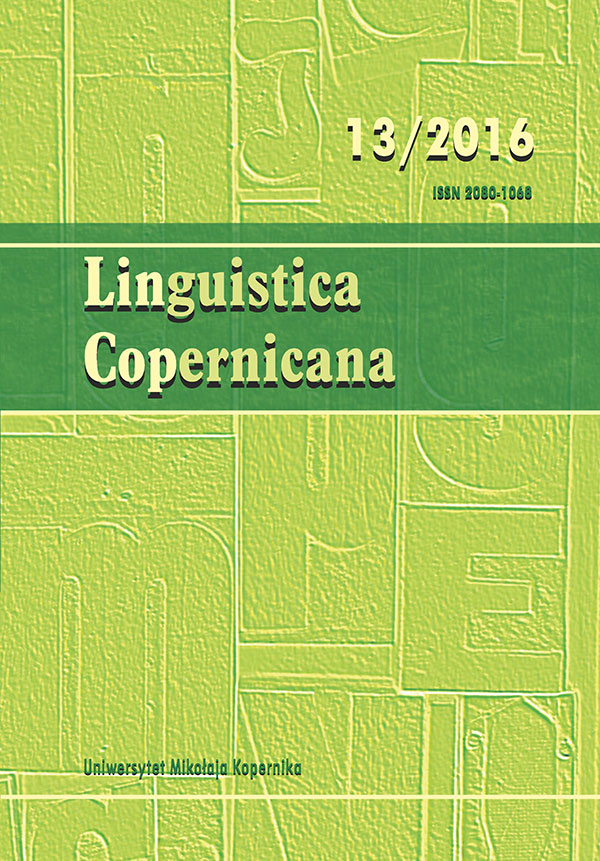Impoliteness in interlanguage requests of EFL learners in Poland
DOI:
https://doi.org/10.12775/LinCop.2016.016Keywords
interlanguage pragmatics, impoliteness, Polish EFL learners, requestive directness, mitigating/aggravating devicesAbstract
This study intends to expand the range of studies on the acquisition of pragmatic competence in English as a foreign language, with special attention paid to impoliteness. It examines the development of one component of learner interlanguage pragmatics, i.e., requests, and looks for acquisitional patterns in modifying their impositive force in advanced Polish learners of English. A sample of linguistic written data was collected in a longitudinal study by means of a discourse completion task (DCT). The author seeks evidence of impoliteness by examining alerters, external moves, internal mitigation, together with strategies for expressing the directness of requests. On this basis, conclusions about noticeable impoliteness in the interlanguage pragmatic competence of the participants are drawn.
References
Beebe L., 1997, Rude awakenings: Ways of responding to rudeness, in: L.F. Bouton (ed.), Pragmatics and Language Learning, Urbana–Champaign: University of Illinois, p. 1–35.
Blum-Kulka S., 1987, Indirectness and politeness in requests: Same or different, Journal of Pragmatics 11, p. 131–146.
Blum-Kulka S., House J., Kas per G. (eds.), 1989, Cross-cultural Pragmatics: Requests and Apologies, Norwood, N.J.: Ablex.
Bousfield D., 2008, Impoliteness in Interaction, Amsterdam: Benjamins.
Bousfield D., Culpeper J., 2008, Impoliteness: Eclectism and diaspora. An introduction to the special edition, Journal of Politeness Research 4, p. 161–168.
Brown P., Levinson S., 1978, Universals of language usage: Politeness phenomena, in: E.N. Goody (ed.), Questions and Politeness, Cambridge: Cambridge University Press, p. 56–234.
Brown P., Levinson S., 1987, Politeness: Some Universals in Language Use. Cambridge: Cambridge University Press.
Cash man H., 2006, Impoliteness in children’s interactions in a Spanish/English bilingual community of practice, Journal of Politeness Research 2(2), p. 217–246.
Culpeper J., 1996, Towards an anatomy of impoliteness, Journal of Pragmatics 25, p. 349–367.
Culpeper J., 2005, Impoliteness and entertainment in the television quiz show: The Weakest Link, Journal of Politeness Research 1, p. 35–72.
Culpeper J., 2009, Impoliteness: Using and understanding the language of offence [online], http://www.lancaster.ac.uk/fass/projects/impoliteness/bibliography.htm, [25.07.2014].
Culpeper J., Bousfield D., Wichmann A., 2003, Impoliteness revisited: with special reference to dynamic and prosodic aspects, Journal of Pragmatics 35(10/11), p. 1545–1580.
Economidou-Kogetsidis M., 2009, Interlanguage request modification: The use of lexical/phrasal downgraders and mitigating supportive moves, Multilingua 28, p. 79–112.
Einsenstein M., Bodman J.W., 1986, ‘I very appreciate’: Expressions of gratitude by native and non-native speakers of American English, Applied Linguistics 7, p. 167–185.
Ellis R., 1992, Learning to communicate in the classroom, Studies in Second Language Acquisition 14(1), p. 214: 225.
Ellis R., 2003, The Study of Second Language Acquisition, Oxford: Oxford University Press.
Kasper G., 1990, Linguistic politeness. Current research issues, Journal of Pragmatics 14, p. 193–218.
Koike, D., 1989, Pragmatic competence and adult L2 acquisition: Speech acts in interlanguage, The Modern Language Journal 73, p. 279–289.
Lakoff R., 1989, The limits of politeness: Therapeutic and courtroom discourse, Multilingua 8, p. 101–129.
Liu J., 2007, Development of a pragmatics test for Chinese EFL learners, Language Testing 24 (3), p. 391–415.
Marriott, H., 1995, The acquisition of politeness patterns by exchange students in Japan, in: B. Freed (ed.), Second Language Acquisition in a Study Abroad Context, Amsterdam: Benjamins, p. 197–224.
May J. L., 2002, Pragmatics. An Introduction, Oxford: Blackwell.
Ogiermann E., 2009, On Apologising in Negative and Positive Politeness Cultures, Amsterdam: Benjamins.
Rue Y–J, Qiao G., 2008, Request Strategies: A Comparative Study in Mandarin Chinese and Korean, Amsterdam: Benjamins.
Solska A., 2004, Verbal irony and the EFL/ESL learner, in: J. Arabski (ed.), Pragmatics and Language Learning, Kraków: Universitas, p. 205–218.
Stewart M., 2004, Politeness in Britain: ‘It’s only a suggestion…’, in: L. Hickey, M. Stewart (eds.), Politeness in Europe, Clevedon: Multilingual Matters, p. 116–129
Sweeney E., Hua Z., 2010, Accommodating toward your audience: Do native speakers of English know how to accommodate their communication strategies toward nonnative speakers of English?, Journal of Business Communication 47(4), p. 477– 504.
Szczepaniak-Kozak A., 2013, T he relation between linguistic proficiency and pragmatic appropriacy, in: I. Headlandová Kalischová, M. Nĕmec (eds.), English as the Lingua Franca of the Modern World, Brno: Masaryk University Press, p. 39–54.
Szczepaniak-Kozak A., 2 014, Interlanguage pragmatics: A study into the acquisition of pragmatic competence in EFL context, in: S. Adamczak-Krysztofowicz, A. Szczepaniak-Kozak (eds.), Kultur-Kommunikation-Kreativität-Reflexivität, Frankfurt a.M.: Peter Lang, p. 59–76.
Szczepaniak-Kozak A., 2015, Interlanguage pragmatics: Analysis o f requests produced by EFL learners in academic context, in: M. Murawska, E. Wąsikiewicz- Firlej, A. Szczepaniak-Kozak (eds.), Discourses in Co(n)text – The Many Faces of Specialized Discourse, Newcastle Upon Thyne: Cambridge Scholars Publishing, p. 352–383.
Takahash i S., 2001, Input enhancement in developing pragmatic competence, in: K. Rose, G. Kasper (eds.), Pragmatics in Language Teaching, Cambridge: Cambridge University Press, p. 171–199.
Wiechecka A. 2007, (Im)politeness and (in)directness, in: J. Arabski, D. Gabryś-Barker, A. Łyda (eds.), Studies in Language and Methodology of Teaching Foreign Languages, Katowice: Para, p. 248–260.
Wierzbicka A., 1985, Different cultures, different languages, different speech acts: Polish vs. English, Journal of Pragmatics 9(2/3), p. 145–178.
Wierzbicka A., 2003, Cross – Cultural Pragmatics: The Semantics of Human Interaction, Berlin/New York: Mouton de Gruyter.
Downloads
Published
How to Cite
Issue
Section
Stats
Number of views and downloads: 598
Number of citations: 0



